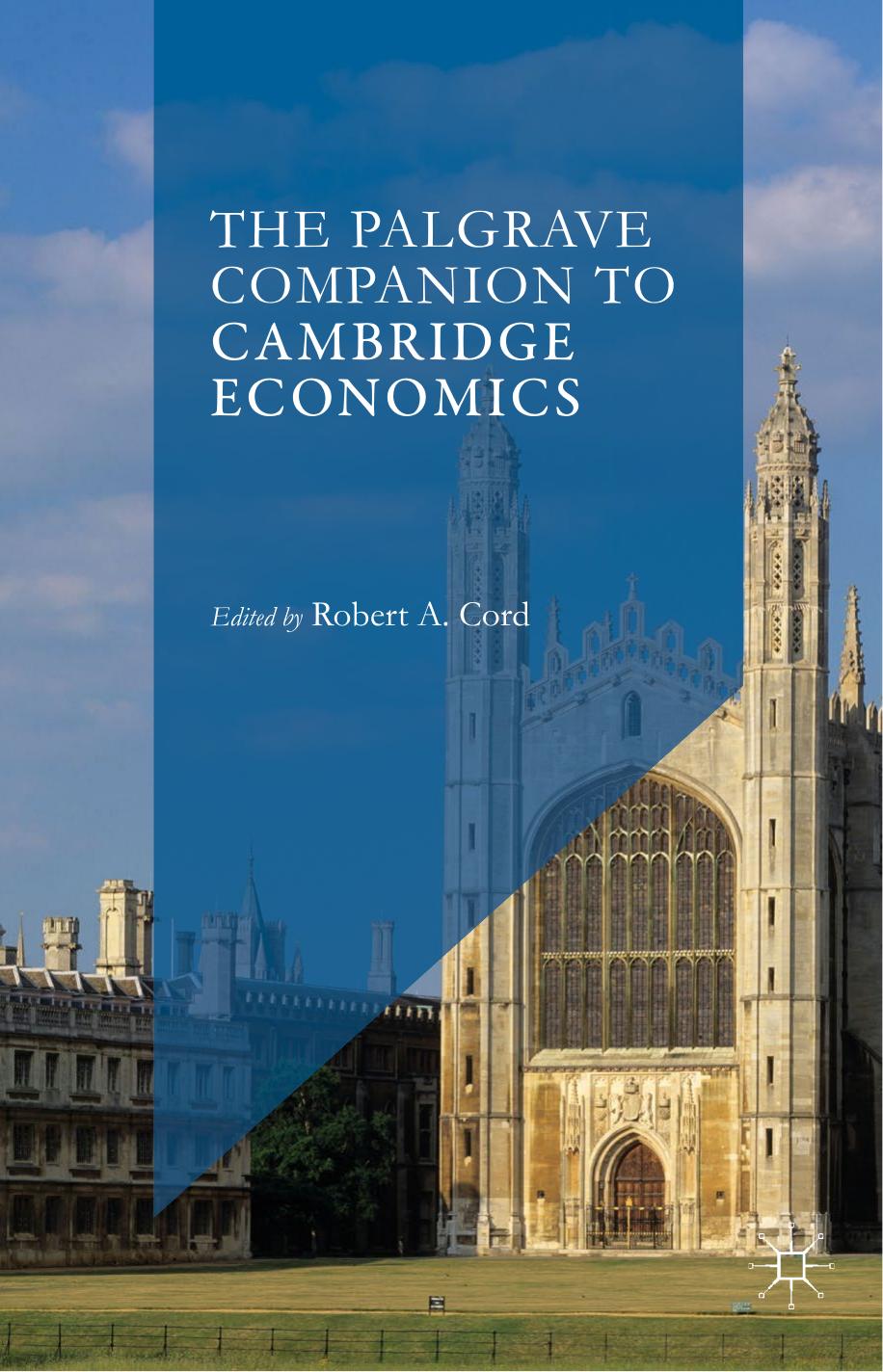The Palgrave Companion to Cambridge Economics 1st edition by Robert 1137412321 9781137412324
$70.00 Original price was: $70.00.$35.00Current price is: $35.00.
Instant download Palgrave Companion to Cambridge Economics The after payment
The Palgrave Companion to Cambridge Economics 1st edition by Robert – Ebook PDF Instant Download/Delivery:1137412321, 9781137412324
Full dowload The Palgrave Companion to Cambridge Economics 1st edition after payment

Product details:
ISBN 10:1137412321
ISBN 13: 9781137412324
Author: Robert
Cambridge University has and continues to be one of the most important centres for economics. With nine chapters on themes in Cambridge economics and over 40 chapters on the lives and work of Cambridge economists, this volume shows how economics became established at the university, how it produced some of the world’s best-known economists, including John Maynard Keynes and Alfred Marshall, plus Nobel Prize winners, such as Richard Stone and James Mirrlees, and how it remains a global force for the very best in teaching and research in economics. With original contributions from a stellar cast, this volume provides economists – especially those interested in macroeconomics and the history of economic thought – with the first in-depth analysis of Cambridge economics.
The Palgrave Companion to Cambridge Economics 1st Table of contents:
Part I: Themes in Cambridge Economics
1: Cambridge’s Contribution to the Revival of Classical Political Economy
1 Introduction
2 Classical Political Economy
3 Vulgar Economy and the Marginal Revolution
4 The Development of Marshall’s Method and Theory
5 Sraffa, Keynes, and the Post-Keynesian Revival of Classical Political Economy
6 The Cambridge Welfare Tradition Versus the Cambridge Keynesian Tradition
7 Concluding Remarks
References
2: Cambridge’s Contribution to Methodology in Economics
1 Introduction
2 The Cambridge Philosophical Tradition and Classical Political Economy
3 The Cambridge Resolution of the Methodenstreit
4 John Maynard Keynes and Methodology in Twentieth-Century Cambridge
5 Cambridge’s Contributions in the Twenty-First Century
References
3: Cambridge Theories of Welfare Economics
1 Introduction
2 Late Nineteenth Century
Sidgwick and the Welfare-enhancing Art of Political Economy
Foxwell on Periodic Mismatches, Speculation, and Welfare
Marshall, Surplus and the Short- and Long-run Aspects of Welfare
John Neville Keynes on Theory in Relation to Concrete Economic Problems
3 Early Twentieth Century
Pigouvian Market Failure and Welfare Analysis
John Maynard Keynes and Welfare
4 Mid-Twentieth Century
A Revival of the Marshallian Approach to Welfare
5 Conclusion
References
4: Cambridge and Development Economics
1 Introduction: Classical Political Economy and the Early Influences on Development Economics
2 Paley and Malthus: The First of the Cambridge Development Economists
3 The Influence of Science: The Marginal Revolution and Biological Evolution
4 The Multidisciplinary Pursuit of Optimality: Alfred Marshall and the Establishment of the Eco
5 The Marshallians: Keynes and the Circus
6 Conclusion
References
5: Cambridge and Econometrics
1 Introduction
2 Economic Theories
3 Relevant Data
4 Relevant Quantitative Analysis
Microeconomic Analysis
Macroeconomic quantitative analysis
Keynes and Econometrics
5 Richard Stone and the Department of Applied Economics
6 Conclusion
References
6: Cambridge in Mind: Economics and Psychology on the Cam
1 The Origins of Psychology
2 Psychology at Cambridge
3 Sidgwick
4 Marshall
5 Pigou
6 Keynes
7 Conclusion
References
7: Post Keynesian Economics in Cambridge
1 Introduction
2 What’s in a Name?
3 While Keynes Lived (Pre-1946)
4 After Keynes: The First 10 Years (1946–1956)
5 The Golden Age That Wasn’t (1956–1973)
6 The Age of Decline (1973–2016)
7 Epilogue
References
8: Cambridge and Economic History
1 Introduction
2 Postan and Economic History
3 The Cambridge Group for the History of Population and Social Structure and E.A. Wrigley
4 History and Economic History
5 Conclusion
References
9: Theories Came and Went, Good Data Endured: Accounting at Cambridge
1 Introduction
2 National Income Accounting
Creating National Accounts
Forecasting and Disaggregating National Accounts
Retrospective National Accounts
3 Business Accounting
IT, Accounting and Economics
The Impact in Economics of the Faculty’s Analyses of Company Accounts
Other Developments in Financial Accounting for Business
4 Occasional Accountants
Microeconomic Theory of Accounting for Business
Accounting Identities in Macroeconomic Theory
Environmental Accounting
Behind the Scenes Contributors
5 The Impact of Faculty Accounting Outside Academe
6 Conclusion
References
Part II: Some Cambridge Economists
10: William Paley (1743–1805)
1 Introduction
2 Paley’s Method of Thought
The Cambridge Context of Paley’s Economic Thought
3 Utilitarian Ethics and Methodological Individualism
4 Other Possible Influences on Paley’s Economic Thought
5 Economic Analysis in ‘Of Population and Provision’
The Interdependence of ‘Provisions’ and ‘Luxuries’
The Generalisation of Mandeville and Optimisation
6 In What ‘Sense’ Was Paley ‘The First of the Cambridge Economists’?
Paley’s Putative Influence on Malthus
A Proto-Keynesian Paley?
Appendices
Appendix A: Stability of Equilibrium
Appendix B: Optimisation
References
11: Thomas Robert Malthus (1766–1834)
1 Introduction
2 Growth TheMainory
3 Aggregate Demand and the Malthus–Keynes Relation
4 Malthusian ‘Physiocracy’ and Its Abandonment
5 Applied Economics
6 Conclusion
References
12: George Pryme (1781–1868)
1 Introduction
2 Life
3 Establishing Economics at Cambridge and Views on Economics
4 Conclusion
References
Main Works by George Pryme
Other Works Referred To
13: Charles Babbage (1791–1871)
1 Introduction
2 EMM—History and Methodological Approach
3 Division of Labour, Mechanisation, and the Size of Manufacturing Plants
4 Transactions Costs
5 Competition and Monopoly
6 Conclusion
References
Cited Works by Charles Babbage
Other Cited Works
14: Henry Fawcett (1833–1884)
1 Introduction
2 Politics and Economics
3 Conclusion
References
Works by Henry Fawcett
Other Works Referred To
15: Henry Sidgwick (1838–1900)
1 Introduction
2 Ethics and Economics
3 Political Economy and Economics
4 Conclusion
References
Works by Henry Sidgwick
Other Works Referred To
16: Alfred Marshall (1842–1924)
1 Introduction
2 Marshall, the Cambridge School, and the Professionalisation of Economics
3 Marshall’s Economics: Equilibrium and Evolution
4 Capital and Labour
5 Applied Industrial Economics
6 Marshall and Macroeconomic Analysis
7 Conclusion
References
Selected Writings of Alfred Marshall
Other Works Referred To
17: Herbert Somerton Foxwell (1849–1936)
1 Introduction
2 The Historicist Movement in England
3 Banking and Currency Studies
4 Competition, Monopolies, and Employment
5 History of Economic Thought
6 Conclusion
References
Selected Writings of Herbert Somerton Foxwell
Other References
18: John Neville Keynes (1852–1949)
1 Introduction
2 The Scope and Method of Political Economy
3 Conclusion
References
Main Works by John Neville Keynes
Other Works Referred To
19: John Harold Clapham (1873–1946)
1 Introduction
2 Clapham and Economics
3 Clapham as an Economic Historian
4 Clapham and Politics
5 Conclusion
References
Works by John Clapham
Other Works Referred To
20: A.C. Pigou (1877–1959)
1 Introduction
2 Early Years at Cambridge
3 Scholarship
4 Leadership
5 Public Service
6 Conclusion
References
Selected Writings of A.C. Pigou
Other References: Unpublished Documents
Published Documents
21: Ralph George Hawtrey (1879–1975)
1 Introduction
2 Hawtrey’s Economics
3 Hawtrey and Some Economic Policy Issues
4 Contemporary Influence
5 Conclusion
References
Selected Key Works by Ralph G. Hawtrey
Other Works Referred To
22: Frederick Lavington (1881–1927)
1 Introduction
2 The 1911, 1912, and 1913 Economic Journal Articles on Banking, Interest, and Speculation
3 The 1921 Book on The English Capital Market
4 The 1922 Study of The Trade Cycle
5 Lavington’s Three Economica (1924, 1926b, and 1927) Papers
6 Conclusion
References
Main Works by Frederick Lavington
Other Works Referred To
23: John Maynard Keynes (1883–1946)
1 Introduction
2 Keynes and Macroeconomics
3 Keynes and International Monetary Reform
4 Conclusion
References
Main Works by John Maynard Keynes
Other Works Referred To
24: Gerald Frank Shove (1887–1947)
1 Introduction
2 The Problem of Increasing Returns
3 The Discussion about Equilibrium and Imperfect Competition
4 Shove and Keynes
5 Conclusion
References
Cited Works by Gerald Shove
Other Cited Works
25: Dennis Holme Robertson (1890–1963)
1 Introduction�
2 Trade Cycles and Equilibrium
3 Money
4 Robertson and the Cambridge Approach to Utility and Welfare
5 Conclusion
References
Cited Works by Dennis Robertson
Other Works Referred To
26: (Edward) Austin (Gossage) Robinson (1897–1993)
1 Introduction
2 School and Early Cambridge Days
3 Christian Beliefs and African Economic Development in the 1930s
4 Austin’s Response to The General Theory
5 Austin and Whitehall
6 Austin and the IEA
7 Austin in the Faculty of Economics and Politics and Sidney Sussex College
8 Contemporaries’ Impressions and Evaluations of Austin
9 Conclusion
References
Main Works by Austin Robinson
Other Works Referred To
27: Piero Sraffa (1898–1983)
1 Introduction
2 Gramsci, Wittgenstein, and Ricardo
3 The Sraffian Revolution: Critique and Reconstruction
4 The Debates in Capital Theory and the Sraffian Schools
5 Conclusion
References
Main Works by Piero Sraffa
Other Works Referred To
28: Maurice Herbert Dobb (1900–1976)
1 Introduction
2 Classical Political Economy: A Theoretical Way Forward
3 Intellectual Versatility and Influence
4 The Entrepreneurial Myth and the Instability of Capitalism
5 Underdevelopment and the Virtues of Planning
6 Dobb’s Philosophical Ontology and Methodology
7 British Marxian Economic Historians
8 Studies in the Development of Capitalism
9 Conclusion
References
Main Works by Maurice Dobb
Other Works Referred To
29: Frank P. Ramsey (1903–1930)
1 Introduction
2 The Cambridge Road to Genius
3 Ramsey’s Economics
4 Crossing the Atlantic
5 Conclusion
References
Cited Works by Frank Ramsey
Other Works Referred To
30: Joan Violet Robinson (1903–1983)
1 Introduction
2 Against Marshall: Realism of Assumptions and Internal Logic: Economics of Imperfect Competition
3 Economics Is a Serious Subject (ESS): Fact and Value: Science and Ideology
4 Keynes
5 Marx
6 Socialist Democracy
7 Growth and Distribution
8 Socialism and Planning: Development Issues
9 Political Economy
10 Conclusion
References
Main and Cited Works by Joan Robinson
Other Cited Works
31: Richard F. Kahn (1905–1989)
1 Introduction
2 Employment, Liquidity, and the Fight Against the Quantity Theory of Money
3 Markets and Prices: Superseding the Theory of Perfect Competition
4 Reforming International Economic Institutions
5 Kahn as a Cambridge Economist
6 Conclusion
References
Works by Richard Kahn
Other Works Referred To
32: James Meade (1907–1995)
1 Introduction
2 The Cambridge Circus
3 Geneva and London
4 Return to Cambridge
5 Conclusion
References
Main works by James Meade
Other Works Referred To
People also search for The Palgrave Companion to Cambridge Economics 1st :
the cambridge companion to plato pdf
the cambridge companion to the ancient greek economy
the cambridge companion to plato’s republic
the cambridge companion to early greek philosophy


